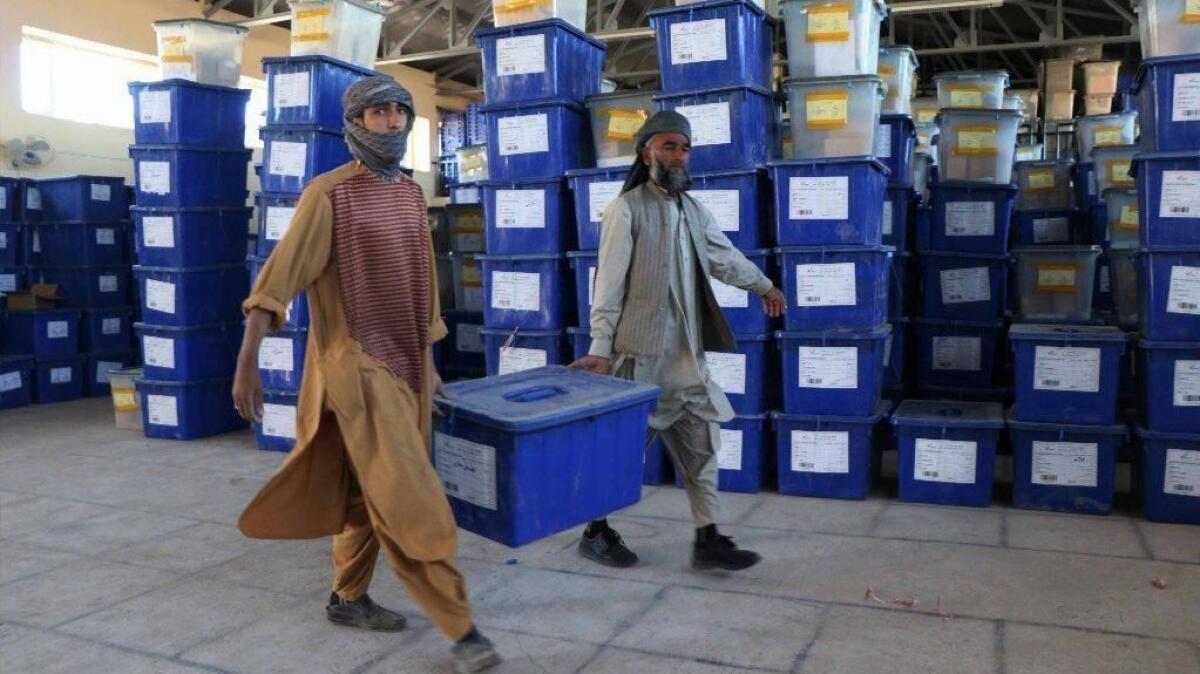Young parliamentary candidates challenge old guard in Afghan elections marred by violence

- Share via
Reporting from Kabul, Afghanistan — Their faces beam down from campaign billboards and banners blanketing the Afghan capital: young people, more than ever before, competing in this month’s parliamentary elections.
Nearly half of the roughly 2,500 candidates on ballots are younger than 40, an unprecedented wave that is challenging entrenched power brokers and promising to fight corruption and mismanagement in Afghanistan’s beleaguered government.
“We have seen in the past that most Parliament members were not educated or were notorious war criminals, corrupt or convicts,” said Javid Faisal, a 26-year-old former government spokesman now running to represent the southern city of Kandahar in the 250-seat legislature.
“Now it’s the time and opportunity for voters to elect and recognize the best candidate — not to vote for those malefactors again but to vote for competent and qualified candidates.”
Zohra Nowruzi, a 29-year-old TV anchor running to represent Kabul — and one of more than 400 female candidates in the elections — adopted the campaign slogan “People have the power.”
“Laws in the Parliament haven’t met the demands of the people, and I think people haven’t achieved their legal rights,” Nowruzi said. “I’ll be there to join a group of young parliamentarians with the motivation to reform laws and enact new plans for the benefit of the people.”
The emergence of a new generation of first-time candidates is, to many Afghans, a bright spot at a time of worsening security, growing casualties among civilians and government forces, and a deepening sense that, despite fledgling peace overtures, a war now in its 18th year seems further than ever from resolution.
Taliban insurgents oppose elections as a foreign plot and have staged attacks in the days before the vote. On Thursday, the Taliban claimed the brazen assassination of a powerful police chief in Kandahar province, a day after it killed a candidate in the neighboring province of Helmand by detonating explosives planted under a sofa in his office. He was the fifth parliamentary candidate to be killed during the campaign.
Election officials said Friday that voting in Kandahar would be postponed by a week because of the attack. Balloting had already been canceled in Ghazni province, southwest of Kabul, because of disputes over ethnic representation, along with fears of violence. The Taliban control several Ghazni districts, and in August, it thrashed the provincial capital for several days, killing scores of soldiers and civilians, before retreating under a U.S.-backed government offensive.
The insurgents have remained on the offensive even as President Ashraf Ghani and the United States try to persuade the group’s leadership to join peace talks for the first time.
Last week, U.S. officials met with Taliban representatives in the Persian Gulf nation of Qatar, the most recent in a series of meetings aimed at building confidence for face-to-face talks to end the fighting.
The Taliban said in a statement this week that the upcoming vote “is a foreign plot to prolong occupation” and warned that its fighters would attack schools where voting would take place, urging teachers and students to stay away.
As a precaution, the government has closed public schools until the day after the election and deployed 50,000 security forces nationwide to protect polling centers. Preliminary results are expected Nov. 10.
In the last parliamentary elections, in 2010, 93 candidates younger than 40 won seats. Financial and security problems, as well as political bickering over election commissioners, combined to delay the upcoming vote by three-and-a-half years.
Afghanistan does not have traditional political parties, so the vast majority of candidates are running as independents. The vote is seen as an important milestone before presidential elections scheduled for the spring.
These will be the third parliamentary elections since the U.S.-led invasion toppled the Taliban in 2001, and Afghans’ faith in their elected officials has eroded over the years.
Lawmakers and government ministers have accused members of Parliament of various crimes — including embezzlement, land grabbing, illegal construction and smuggling of drugs and alcohol — but no Parliament member has ever been convicted of the charges.
This month, the independent Afghanistan Institute for Strategic Studies published a poll showing that less than 10% of Afghans were satisfied with the performance of lawmakers, and 53% believed they followed personal interests rather than those of their country or constituents.
Still, nearly 70% said they were willing to vote in the elections despite security fears and frustration with the government. In a country where two-thirds of the 35.5 million population is younger than 25, many said the Afghan government needed new faces.
“The patriarchal and tribal policies institutionalized in the country that have caused disappointment among the youth — and the advancement of technology and developments across the globe — are forcing these youths into confrontation with the current system,” said Mohammad Shafaq Khawati, a sociologist at Avicenna University in Kabul.
Not every young candidate has been a sign of potential change, however. Many children and relatives of ex-warlords and ethnic militia leaders are also on the ballot — including the son of the controversial vice president, Abdul Rashid Dostum, and the son of Gulbuddin Hekmatyar, a militia commander formerly known as the “Butcher of Kabul,” who recently entered into a truce with the government.
Hekmatyar’s son, 40-year-old Jamaluddin Hekmatyar, said he was also part of the youth wave because he was seeking office to “carry out my national and religious responsibility.”
Some first-time office-seekers acknowledged they were at a disadvantage against entrenched power brokers, who have greater influence and resources.
“These irresponsible people…use force and compel people not to vote for us, and force them to vote for their own favorite candidates,” said Jamalnaser Farahmand, a 28-year-old journalist and candidate from the northern province of Faryab.
Khawati said it would take a few election cycles to dislodge the older generation of representatives.
“We cannot expect this transition to be completed in this election,” he said. “The young generation will find its place in the government gradually.”
Special correspondent Faizy reported from Kabul and Times staff writer Bengali from Mumbai, India.
Special correspondent Faizy reported from Kabul and Times staff writer Bengali from Mumbai, India.
Shashank Bengali is South Asia correspondent for The Times. Follow him on Twitter at @SBengali
More to Read
Sign up for Essential California
The most important California stories and recommendations in your inbox every morning.
You may occasionally receive promotional content from the Los Angeles Times.














